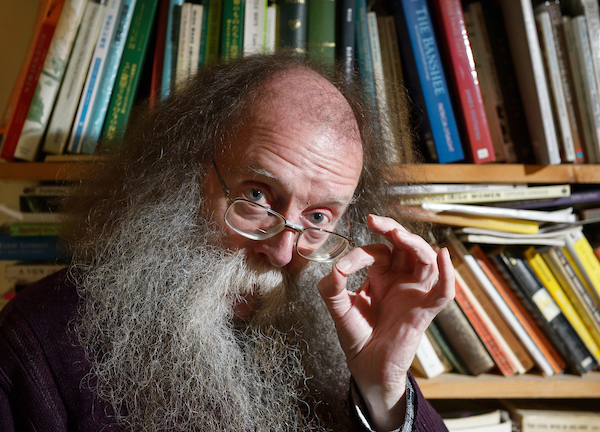BACK in the 1980s when Eddie Lenihan’s eldest son Keith was four years old, Eddie started telling him stories about Fionn Mac Cumhail.
From those beginnings Eddie’s stories about a legendary Irish hero have enthralled and delighted both children and adults, with another book having just been published, Fionn Mac Cumhail and the Baking Hags.
It’s certainly a title that catches the attention and the plot has echoes of Eddie’s own battle to preserve a thorn bush when the M18 was being constructued, over 20 years ago.
While it is suitable for young readers, there are also political undertones that more mature readers will appreciate. “There’s a big road being built from Tara, a new highway, sound familiar? Of course on their journey, of all the building and digging, they come across something in the landscape, as these things usually do. Even though it’s a story back from the time of Fionn Mac Cumhail, I hope people see that it has a very modern touch to it. What they discover of course is something horrible, which holds them up a lot. So they have to refer it back to the High King’s Druid, King Cormac’s Druid. King Cormac is the equivalent of the Government today, and he is, as he always in my stories, an eejit. Sound familar again?”
Eddie says those concerned with the environment will probably appreciate it. “It turns into a horror story and children will love that, but environmentalists will very much appreciate it too. It’s a story of the landscape, and what we will find today in the landscape. Anywhere you go today there are diggers and bulldozers constantly rooting.A book I wrote called the Man in the Big House, it was about Jimmy Armstrong, who was supposed to be mad, one thing he always said to me was that he hated to see these big diggers, he was afraid they’d flatten something that was precious and it’d be gone forever. There was a man in an asylum for nearly 30 years and he knew that much.”
Eddie says that the stupidity of the character King Cormac makes his book funny, and he also sees a type of dark humour around the failures of official Ireland. “The book is humourous too, because King Cormac is a fool, he’s an idiot. Look around you today, look at the RTE debacle, there’s humour in that. There’s the other side in that it has cost millions, but the humour is that we knew it all the time, look at the salaries being paid, we knew that was obscene. Everybody knew this was obscene, that a salary bigger than the Taoiseach’s was being paid to some eejit of an entertainer! It was humourous, but it was dark humour, obscene humour. It’s the same in the books King Cormac is in charge of the country and he knows nothing. He has to depend on his druid, and he abuses him, but the Druid is a wiser man than to argue, he gets on with the job somehow behind the scenes, because the country has to be kept going for the sake of ordinary people, not the idiots in charge.”
The characters in his books are very much of Ireland, and he feels that Irish culture isn’t prominent enough in the stories the next generation are growing up on. “For children now it’s all these suburban stories, or these crazy stories from America, Captain this or that or space stuff, but we have our own stuff here. Our own heroes here like Fionn MacCumhail who are related to our landscape. We can tie all these things together, the environmentalism, the hero tales and the landscape we have our own feet on, to make something that’s unique to us. But we’re not doing it, we’re importing this shite from America. It is mostly from America, just like our music and all the rest of it, but we’re giving away our own culture. And it’s a wonderful culture.”
Much of Eddie’s writing is done at tables in two Crusheen bars, a short walk from his house. “I go to the pub, up to Clarke’s and Fogarty’s, and I always take my writing with me and get on with it there. The boys might be wondering what is that fella doing, why doesn’t he join in the conversation. I sometimes do, but look, I regard the pub as a place to get on with the work and have a couple of pints to relax, and let people think what they will. The older generation were very humourous about it, they’d be saying ‘oh you’re in your office again tonight’. They adapted very fast to seeing somebody writing in a pub, for their generation it must have been very unusual.”
As one of the country’s top seanachaí he has been telling his stories to children for 40 years or more. He says that there are big changes in those coming up now, with the impact of technology very apparent. “The huge difference that has happened are these devices, I call them the beep beep generation. They get so absorbed in these screens that you almost have to kick them to get their attention. There has been such a change in young lads, it’s incredible, absolutely incredible.”
He has no doubt that the changes are not for the better. “Absolutely not. Their attention span has shrunk. These things, they hold their attnention, but their attention span listening to you face to face… They can’t do it. And I think that’s a sad thing.”
He would like to think that his stories, which are vivid and action packed, can help youngsters and draw them away from their electronic devices. “I hope so, and I would have that in mind. I have seen the affect of the other thing. I visit schools, I tell them these stories as I always did and they are very interested when they see the stories acted out before them. Whether they will read the stories, that’s up to parents and teachers.
“I’m afraid a lot of parents use them as a baby minder, a very efficient one. Very often a parent will say where is he or she, and you find them in a corner absorbed on the screen, you won’t hear a geek out of them for the next half an hour. But the long term damage they might be doing might be a lot bigger than you think, turning the child into a fool. One of the biggest things a child can have is being able to concentrate.”
He says that some of the youth violence that has been seen this summer is the the result of inner pain expressed outwardly. “We all ask why are these gangs of young lads violent, why are they attacking people. We see them in Dublin, we see them in Ennis. Young lads don’t do that unless there is something wrong with them inside, unless they have missed out on something someplace. It’s no use blaming. I think the Government should appoint some competent people, not talkers, to sit down and ask what can we do about this that is practical? Not just talk about it, not just throw money at it, but to say there’s a serious problem here, can we do something about it, these are people, and it’ll get worse if nothing is done.”
He feels that the country nowadays is facing a lot of problems, with people who want to make a difference not getting the support required. “It’s frustrating, here we are 100 years after we got our independence and we still don’t have a republic that is fit for purpose.
“There are people who want to make it better, but sometimes they aren’t given the simple means of doing it, but the means aren’t there. There was a gang of people out cleaning up the village here the other night, fair dues to them, they did a lovely job. There they were doing that, but the Council didn’t provide a bin for them to put it away. It’s scandalous. What do we pay these taxes? Oh, we’ll get ye facilities, but then nothing. And that’s the way in probably every village around Clare, maybe not every village but a lot of them.”
Owen Ryan has been a journalist with the Clare Champion since 2007, having previously worked with a number of other publications in Limerick, Cork and Galway. His first book will be published in December 2024.



